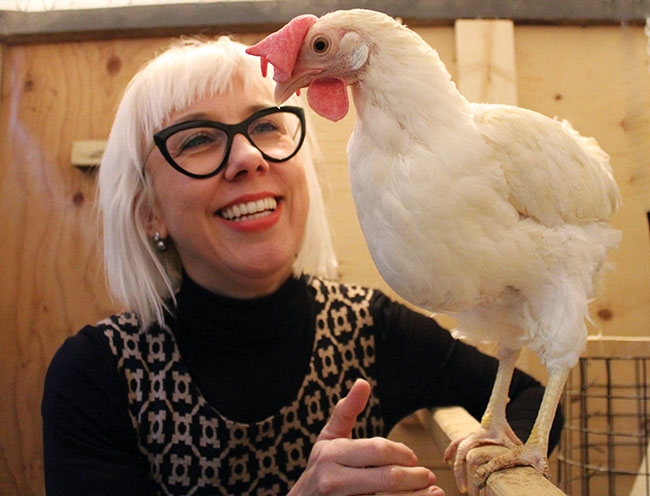
LRIC update: Study looks at laying hens’ manure
By Lilian Schaer
Features HealthResearchers team up for air quality project.

When it comes to animal welfare, Alexandra Harlander prefers to get her information straight from the horse’s mouth. Or, in this case, directly from the poultry she’s studying.
As a veterinarian and assistant professor in the University of Guelph’s Department of Animal Biosciences, she focuses on poultry behaviour and welfare, applying bird health and preference tests to current management practices to enhance poultry well-being and health.
“I always want to ask the animal what is good for them, that is my approach,” she explains, adding that when it comes to manure (feces and urine), for example, the birds are pretty specific.
Ammonia is one a big air quality challenge in poultry barns. Harlander teamed up with Bill van Heyst of Guelph’s School of Engineering on a project to determine the impact on laying hen behaviour of fresh air versus air contaminated with ammonia.
In fresh air environments, birds spent more time foraging and started foraging faster, and were more likely to spend a longer time foraging in air with naturally occurring ammonia instead of introduced synthetic ammonia.
This can have implications for recommendations on things like barn ventilation, manure management and litter quality in the national codes of practice for the care and handling of poultry, but will also impact how future behavioural research involving poultry and ammonia effects are conducted.
“Birds behave differently under different conditions and they can differentiate between natural and synthetic ammonia,” Harlander says. “Providing fresh litter substrate is very important.”
Enriched cages for laying hens provide scratch pads on the mesh floors for natural hen behaviours like foraging and dust bathing. When no litter material is provided, though, manure can accumulate on the pads.
Another of Harlander’s behavioural projects showed that while the birds prefer to rest in clean areas, they like to forage and will do so in soiled litter or on dirty scratch pads if they have no other forage material available.
“Other animals tend to avoid soil areas, but birds will not avoid poop on their scratch pads if that’s the only thing they have to forage in,” she says.
Another interesting angle to the manure story, according to Harlander, is that laying hens will also eat manure from other birds, especially if they’re forced to forage in dirty litter.
Although they had a clear preference for clean feed, hens in another Harlander study consumed an average of 61.3 grams per day of feed containing feces and urine. What’s not known yet is how this manure consumption affects birds’ gut and overall health and work is now underway to investigate this in more detail, including how this could be linked to abnormal behaviours and feather pecking.
For egg farmers, Harlander’s research provides some clear recommendations:
- Birds prefer fresh air: Clean litter substrate and good ventilation will keep barn air quality high.
- Laying hens like to forage: Providing small amounts of clean forage materials prevents foraging in dirty litter or on soiled scratch pads
- Hens will ingest manure: Keeping feed clean lessens the chance they’ll eat manure, the health and behavioural impacts of which are not yet known.
These three studies all received funding through the AgriInnovation program of Growing Forward 2.
This article is provided by Livestock Research Innovation Corporation as part of LRIC’s ongoing efforts to report on Canadian livestock research developments and outcomes.
Lilian Schaer is a freelance writer and editor and communications specialist with Agri-Food Project Services Ltd. in Guelph, Ont.
Print this page